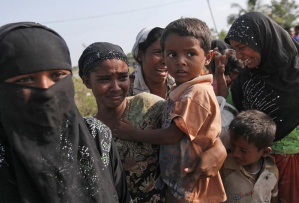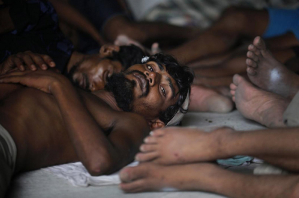
Indonesia and Malaysia have agreed Wednesday to temporarily take in migrants arriving on their shores in boatfuls plus the more than 2,000 migrants still stranded at sea on the condition that they be resettled in less than a year.
The two countries have previously refused these migrants into their shores and sent them back to sea after giving them supplies and fuel.
The agreement was made after representatives from Indonesia, Malaysia and Thailand met in Kuala Lumpur to discuss a possible solution for the surge of refugees, also called "boat people," who are believed to be primarily Rohingya Muslims fleeing from Myanmar.
However, Indonesian Vice President said more talks may be necessary because the countries have various considerations in taking the Rohingya migrants in.
Rohingya Muslims have long been persecuted in Myanmar, which is a predominantly Buddhist country. They are not recognized in their country, and even the term "Rohingya" is not recognized by the government of Myanmar. Instead, the Rohingya are referred to as "Bengalis," which is the word used for illegal migrants from Bangladesh, even though they have stayed in the country for many generations.
In the last few years, an estimated 120,000 Rohingya have fled Myanmar to avoid the violent attacks of Buddhist extremists. Many Rohingya have died in the hands of their persecutors while others have been captured and placed in prison camps.
Although it has a key role in solving the present migrant problem, Myanmar refuses to be involved in talks where the Rohingya are concerned, which is why they did not send a representative when the three countries met in Kuala Lumpur on Wednesday.

The U.N. High Commission on Human Rights (UNHCR) said in a statement that the Indonesia's and Malaysia's decision to help stranded refugees is "an important initial step in the search for solutions to this issue, and vital for the purpose of saving lives," CNN reported.
UNHCR further said, "UNHCR itself is ready to work with countries in the region to find solutions to the plight of these people. These ultimately may include returning people to their home countries voluntarily and once conditions allow."
The U.S. said it will take part in any international effort of the UNHCR to help save lives and resettle the migrants, but the root cause of the problem, which is "the treatment of the Rohingya population inside Myanmar," must be dealt with, CNN reported.
On Thursday, Malaysian Prime Minister Najib Razak has called for search and rescue operations for Rohingya migrants who are still at sea. "We have to prevent loss of life," he said, according to Miami Herald.
Four navy ships set out to look for refugees who have been reportedly in boats off the coast of Myanmar for more than 30 days. The Malaysian government has also readied three helicopters and three more ships on standby.
Amid the softening of the southeast Asian countries toward the plight of the Rohingya refugees, Myanmar also reversed its earlier decision not to attend the upcoming ASEAN meeting in Bangkok on June 29, saying that it will participate.
Meanwhile, Australia and Thailand stand firm in their decision not to welcome migrants to their shores.
Australian Prime Minister Tony Abbott said, "I'm sorry. If you want to start a new life, you come through the front door, not through the back door," according to the Guardian.
He added that they will not encourage the refugees to get on their boats and flee their country. "If we do the slightest thing to encourage people to get on the boats, this problem will get worse, not better."






